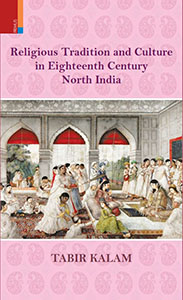
Religious Tradition and Culture in Eighteenth Century North India
AUTHOR- Tabir Kalam
| HB ₹795 . $59.95 . ₤39.95 |
||
INFORMATION
- AUTHOR : Tabir Kalam
- HB ISBN : 978-93-80607-39-9
- Year : 2013
- Extent : xii + 188 pp.
- Discount available on checkout
- Usually dispatched within 3 to 5 working days.
Religious Tradition and Culture in Eighteenth Century North India
| HB ₹ 795 . $ . ₤ |
PB ₹ . $ . ₤ |
|
| POD ₹ . $ . ₤ |
e-Book ₹ . $ . ₤ |
INFORMATION
- AUTHOR – Tabir Kalam
- ISBN – 978-93-80607-39-9
- Year – 2013
- Extent: 400 + 40 coloured illustrations
- 10% discount + free shipping
- Usually dispatched within 3 to 5 working days.
Religious Tradition and Culture in Eighteenth Century North India contends that the ‘decline’ in the political scenario of eighteenth-century India did not imply an all-round decay and stagnation of society, especially in its religious and cultural realms. The emergence of regional forces, following the disintegration of the Mughal empire, greatly aided the promotion of regional centres which provided the grounds for a religious and cultural efflorescence. Shifting the focus away from the often-examined political and economic aspects of the eighteenth century transition, the book studies a wide array of primary sources in Persian and especially in Urdu, to instead bring the study of intellectual and cultural trends to the centrestage of historiography. It has brought into prominence the vibrant religious intellectual outpouring, the Shia-Sunni polemics, educational innovations, growth and spread of Urdu and its entanglement with regional sensibilities and regional networks of patronage, and, finally, the diffusion of the Mughal court culture in different regional centres. The study’s discussions on decentring of the Empire and the subsequent pluralized manifestation of cultural production and consolidation in various regional court circles widen the scope of current debates on the nature of the eighteenth century in Indian history.
The Author
Tabir Kalam is Assistant Professor in Medieval Indian History at the Banaras Hindu University, Varanasi. He received his M.Phil. and Ph.D. from the Centre for Historical Studies (CHS), Jawaharlal Nehru University, New Delhi.
Religious Tradition and Culture in Eighteenth Century North India contends that the ‘decline’ in the political scenario of eighteenth-century India did not imply an all-round decay and stagnation of society, especially in its religious and cultural realms. The emergence of regional forces, following the disintegration of the Mughal empire, greatly aided the promotion of regional centres which provided the grounds for a religious and cultural efflorescence. Shifting the focus away from the often-examined political and economic aspects of the eighteenth century transition, the book studies a wide array of primary sources in Persian and especially in Urdu, to instead bring the study of intellectual and cultural trends to the centrestage of historiography. It has brought into prominence the vibrant religious intellectual outpouring, the Shia-Sunni polemics, educational innovations, growth and spread of Urdu and its entanglement with regional sensibilities and regional networks of patronage, and, finally, the diffusion of the Mughal court culture in different regional centres. The study’s discussions on decentring of the Empire and the subsequent pluralized manifestation of cultural production and consolidation in various regional court circles widen the scope of current debates on the nature of the eighteenth century in Indian history.
The Author
Tabir Kalam is Assistant Professor in Medieval Indian History at the Banaras Hindu University, Varanasi. He received his M.Phil. and Ph.D. from the Centre for Historical Studies (CHS), Jawaharlal Nehru University, New Delhi.




